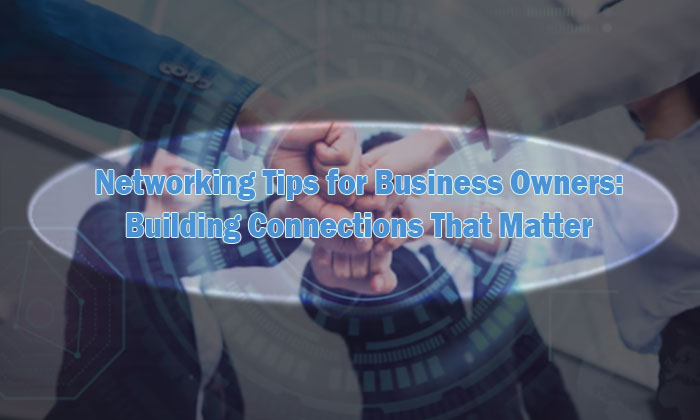
Networking is a powerful tool for business owners looking to grow their enterprises, build relationships, and gain new opportunities. As an entrepreneur, it’s essential to understand that networking is more than just collecting business cards or attending events — it’s about forming genuine, lasting connections that can benefit both your personal and professional life. When done right, networking can provide valuable insights, collaborations, mentorship, and even potential clients. In this article, we’ll explore some effective networking tips for business owners to help you build connections that truly matter.
1. Focus on Building Genuine Relationships
The foundation of successful networking is building real, meaningful relationships. Many entrepreneurs make the mistake of treating networking as a transactional activity — they attend events or meetings with the sole intention of finding immediate business opportunities. While that might work in some cases, building authentic relationships should always come first.
Key Actions:
- Be Approachable and Friendly: Focus on getting to know others by showing genuine interest in their businesses, challenges, and goals. Take time to listen actively and ask thoughtful questions.
- Offer Value First: Instead of approaching someone with an immediate pitch, think about how you can help them first. Maybe you have knowledge, resources, or contacts that could assist them. By providing value, you build trust and show that you’re invested in their success.
- Follow Up Thoughtfully: After a meeting or event, send a personalized message to continue the conversation. Mention something specific from your discussion to show you were paying attention and are genuinely interested in staying connected.
Building trust and rapport will naturally lead to more productive and beneficial relationships in the long run.
2. Attend the Right Events
Networking events are a great way to meet like-minded individuals, but not all events are created equal. As a business owner, it’s essential to choose events that align with your business goals, industry, or personal interests.
Key Actions:
- Industry-Specific Conferences: Attending industry-specific conferences or trade shows allows you to meet potential partners, clients, or mentors who understand your market and can offer valuable insights.
- Local Networking Groups: Many cities have local business associations or entrepreneurial meetups that cater to small business owners and startups. These events often provide more intimate settings for building connections.
- Workshops and Seminars: Participate in workshops or seminars where you can learn new skills or deepen your knowledge in areas that benefit your business. These settings often foster more in-depth discussions and networking opportunities.
By attending the right events, you increase your chances of meeting people who share similar goals and who can offer the resources or connections you need.
3. Leverage Social Media and Online Networking
In today’s digital age, networking doesn’t have to be limited to in-person events. Online platforms provide entrepreneurs with a vast network of potential connections that can help grow their businesses. Social media platforms like LinkedIn, Twitter, and even Facebook can be powerful tools for business owners.
Key Actions:
- Optimize Your LinkedIn Profile: LinkedIn is a professional networking platform that allows you to showcase your expertise, experience, and business goals. Be sure your profile is up-to-date and reflects your business identity. Engage in relevant discussions, share insightful content, and connect with others in your industry.
- Join Industry-Focused Groups: Many social media platforms host industry-specific groups where business owners and professionals discuss trends, share resources, and collaborate. Participating in these groups helps you stay informed while connecting with peers.
- Engage on Twitter: Twitter is a great place to join conversations around business trends, entrepreneurship, and innovation. By engaging in these conversations and sharing valuable insights, you can attract like-minded entrepreneurs to your network.
Social media allows you to expand your reach and connect with potential partners, clients, or advisors outside your immediate geographic area.
4. Practice the Art of Reciprocity
Networking is not about taking — it’s about giving. When you approach networking with a mindset of reciprocity, you’re more likely to build strong, lasting relationships. If you help others, whether by sharing knowledge, making introductions, or offering support, they will often return the favor in kind.
Key Actions:
- Be Willing to Share Resources: If you come across useful information, tools, or contacts that could benefit someone in your network, don’t hesitate to share it. This generosity fosters goodwill and shows that you are an asset to others.
- Make Introductions: One of the most valuable things you can do in your network is make introductions between people who could benefit from knowing each other. This strengthens your relationships and shows that you’re genuinely invested in the success of others.
- Offer Your Expertise: If someone in your network is struggling with an issue you have experience solving, offer your expertise or advice. By positioning yourself as a resource, you’ll build a reputation as someone others can turn to for support.
Reciprocity in networking helps create a mutually beneficial environment where both parties feel valued and supported.
Also read other business articles on Destyless:
- Mastering Time Management as an Entrepreneur
- Lessons from Failure: Stories of Entrepreneurs Who Bounced Back
- How to Identify Profitable Business Opportunities
5. Be Consistent and Follow Through
Building a strong network takes time, and one of the key factors in maintaining it is consistency. It’s easy to meet people once, but staying in touch and nurturing relationships is what truly leads to long-term success.
Key Actions:
- Regularly Check In: Don’t let months or years go by without checking in with your contacts. Send them an occasional email or message to catch up, share news, or offer help.
- Attend Follow-Up Meetings: After meeting someone at an event, schedule a follow-up call or meeting. This deeper connection helps to solidify the relationship and explore how you can work together in the future.
- Keep Your Promises: If you promise to send a resource, make an introduction, or help with a task, be sure to follow through. Trust is essential in networking, and following through on commitments shows you’re reliable and dependable.
Consistency and follow-through demonstrate your professionalism and ensure that relationships stay strong and productive.
6. Surround Yourself with Diverse Perspectives
A successful network is one that includes a variety of perspectives, industries, and skill sets. While it’s important to connect with others in your industry, don’t shy away from meeting people in different fields. Cross-industry collaborations can lead to innovative solutions, new business ideas, and valuable learning experiences.
Key Actions:
- Attend Cross-Industry Events: Participate in networking events or conferences that bring together business owners from various industries. Exposure to new ideas and perspectives can inspire fresh approaches to your own business challenges.
- Join Diverse Groups and Associations: Join business groups or chambers of commerce that include a broad range of entrepreneurs. Diversity in your network can spark creativity and open doors to new opportunities.
- Seek Out Mentors from Different Fields: Having mentors from various industries helps you gain a well-rounded perspective on business. They can offer valuable guidance and help you avoid pitfalls that are specific to your industry.
By expanding your network to include diverse perspectives, you open yourself up to a wealth of ideas and opportunities that you might otherwise overlook.
7. Don’t Forget to Network with Your Team
Your internal team is an important part of your broader network. Business owners often focus so much on external connections that they overlook the importance of networking within their own organizations. Building strong relationships with your employees, co-founders, or partners can lead to more productive collaboration and a healthier work culture.
Key Actions:
- Foster Open Communication: Regularly check in with your team members to see how they’re doing, listen to their ideas, and ask for feedback on how the business can improve.
- Encourage Team Bonding: Organize events or activities outside of work to strengthen relationships within your team. A strong internal network often leads to a more motivated and cohesive workforce.
- Support Growth Opportunities: Invest in your team’s professional development by providing networking opportunities, attending conferences together, or sponsoring training programs.
By networking with your team, you build a supportive and collaborative culture that benefits the growth of your business.
Conclusion
Networking is one of the most powerful tools you have as a business owner, and when done effectively, it can open doors to valuable partnerships, clients, and opportunities. By focusing on building genuine relationships, leveraging both in-person and online networks, practicing reciprocity, and staying consistent, you can create a network that supports your business growth for years to come. Remember, successful networking is not just about meeting people — it’s about building meaningful, mutually beneficial relationships that help both you and your connections succeed.






